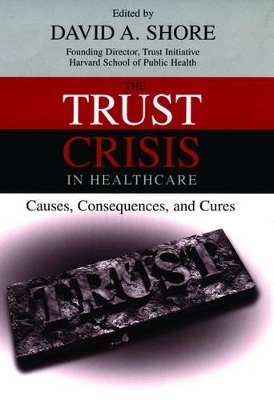
The Trust Crisis in Healthcare
Causes, Consequences, and Cures
Seiten
2006
Oxford University Press Inc (Verlag)
978-0-19-517636-0 (ISBN)
Oxford University Press Inc (Verlag)
978-0-19-517636-0 (ISBN)
Represents a comprehensive survey of the causes and consequences of declining trust in healthcare, and provides suggestions for restoring the trust. This book identifies the elements of trust in the environment of modern healthcare, analyses the sources of mistrust in key areas of medicine, and makes constructive suggestions for restoring trust.
The lack of trust in our healthcare system brings ominous results, from decreasing health outcomes to increasing costs, from organisation inefficiencies to a pervasive pattern of litigation. This will only worsen as healthcare becomes subject to greater market mechanisms, and as patients, providers, and payers view each other with increasing suspicion. Healthcare professionals are just now coming to realise what other professionals have known for years: trust is earned, not assumed. The Trust Crisis represents the first comprehensive survey of the causes and consequences of declining trust in healthcare, and more importantly, it provides suggestions for restoring the trust.
Shore brings together an unparalleled collection of healthcare leaders for this volume. Chapter authors include Donald Berwick, Robert Blendon, Lucian Leape, and George Lundberg. The book also features an introduction by Cokie and Steve Roberts. Causes, consequences, and cures for the crisis in trust are specifically addressed. Critical areas treated by the authors include:
BL systemic conditions that lead to medical errors, and remedies for promoting quality of care
BL outdated modes of doctor-patient communication that hinder compliance
BL novel modes of interaction to improve satisfaction
BL patient-centered care and metrics to evaluate its presence or absence
BL media communication and miscommunication, and new standards for medical reporting
BL clinical insights applied to the use of human subjects in biomedical research
BL recommendations for revising medical school curricula and strengthening the peer-review process in medical journals
BL practical strategies for decreasing the lingering discord between patients, providers, and health plans
While presenting a diversity of topics and opinions, the authors of this volume agree upon a few principles. The trust famine will have dire consequences if it continues unchecked. Healthcare leaders can take measures to improve trust. Regaining trust requires that entire organisations pay closer attention to the "human factors" of healthcare. And perhaps most critical for change, trust-building is not only good medicine, but good business as well.
The lack of trust in our healthcare system brings ominous results, from decreasing health outcomes to increasing costs, from organisation inefficiencies to a pervasive pattern of litigation. This will only worsen as healthcare becomes subject to greater market mechanisms, and as patients, providers, and payers view each other with increasing suspicion. Healthcare professionals are just now coming to realise what other professionals have known for years: trust is earned, not assumed. The Trust Crisis represents the first comprehensive survey of the causes and consequences of declining trust in healthcare, and more importantly, it provides suggestions for restoring the trust.
Shore brings together an unparalleled collection of healthcare leaders for this volume. Chapter authors include Donald Berwick, Robert Blendon, Lucian Leape, and George Lundberg. The book also features an introduction by Cokie and Steve Roberts. Causes, consequences, and cures for the crisis in trust are specifically addressed. Critical areas treated by the authors include:
BL systemic conditions that lead to medical errors, and remedies for promoting quality of care
BL outdated modes of doctor-patient communication that hinder compliance
BL novel modes of interaction to improve satisfaction
BL patient-centered care and metrics to evaluate its presence or absence
BL media communication and miscommunication, and new standards for medical reporting
BL clinical insights applied to the use of human subjects in biomedical research
BL recommendations for revising medical school curricula and strengthening the peer-review process in medical journals
BL practical strategies for decreasing the lingering discord between patients, providers, and health plans
While presenting a diversity of topics and opinions, the authors of this volume agree upon a few principles. The trust famine will have dire consequences if it continues unchecked. Healthcare leaders can take measures to improve trust. Regaining trust requires that entire organisations pay closer attention to the "human factors" of healthcare. And perhaps most critical for change, trust-building is not only good medicine, but good business as well.
INTRODUCTION: REFLECTIONS ON TRUST; PART I. TRUST AND MISTRUST: THE BIG PICTURE; PART II. QUALITY AND SAFETY: THE BASICS OF TRUST; PART III. WHO CAN BE TRUSTED?; PART IV. BUILDING TRUST IN THE BUSINESS OF HEALTHCARE
| Zusatzinfo | 14 line illustrations |
|---|---|
| Verlagsort | New York |
| Sprache | englisch |
| Maße | 236 x 160 mm |
| Gewicht | 513 g |
| Themenwelt | Medizin / Pharmazie ► Medizinische Fachgebiete ► Medizinethik |
| Studium ► Querschnittsbereiche ► Geschichte / Ethik der Medizin | |
| Studium ► Querschnittsbereiche ► Prävention / Gesundheitsförderung | |
| ISBN-10 | 0-19-517636-7 / 0195176367 |
| ISBN-13 | 978-0-19-517636-0 / 9780195176360 |
| Zustand | Neuware |
| Haben Sie eine Frage zum Produkt? |
Mehr entdecken
aus dem Bereich
aus dem Bereich
Die Geschichte eines Weltzentrums der Medizin von 1710 bis zur …
Buch | Softcover (2021)
Lehmanns Media (Verlag)
CHF 27,90
Krankheitslehren, Irrwege, Behandlungsformen
Buch | Softcover (2024)
C.H.Beck (Verlag)
CHF 55,90


